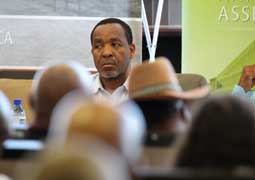
Residents of Limpopo have used the public hearings on the Traditional and Khoisan Leadership Bill to advocate for the equal remuneration for village headmen and headwomen, as well as members of traditional councils in the province.
During public hearings on the Bill at the Peter Mokaba Stadium in Polokwane today, the citizens from the Capricorn District (Polokwane and surrounding areas) told the Portfolio Committee on Cooperative Governance and Traditional Affairs (CoGTA) that the draft legislation should also make provision for the equal remuneration of headmen, headwomen and all other officials involved in the running of the traditional house (bakgoma and bakgomana).
Ms Maria Mamabolo, a Headwoman from the Mankweng Traditional Council, said currently the remuneration of village headmen and headwomen was not done uniformly in the province. She said the laws should treat everybody the same
“Don’t just appoint manduna (headmen and headwomen) and later tell them there is no budget for their remuneration, if there is a law on remuneration of manduna let it apply equally for all and not leave out some,” said Ms Mamabolo.
Her sentiments were echoed by Mr Ngoako Moshaga who said headmen and headwomen did a lot of work on the ground – helping the traditional leadership and the villagers, and deserved compensation.
“We support headmen and headwomen, they are part of our culture and should be remunerated accordingly. We also strongly support the statutory recognition of Khoisan communities and inclusion of their traditional leaders in the existing houses of traditional leaders, their status should be the same as other leaders,” he said.
Some participants felt the recognition of Khoisan traditional leadership was long overdue and urged the Portfolio Committee to speed up the passing of the draft legislation.
“The Khoisan are the most neglected community in our country, they were not recognised for a very long time, they are South Africans and were supposed to be recognised by the Traditional Leadership and Governance Framework Act. They should have been recognised a long time ago,” said Mr Solomon Mongalo.
Mr Philemon Talane from Sekhukhune advised the Committee to “educate the people who are supposed to implement the laws to avoid violations and wrongful implementation”.
“Sometimes instead of assisting people the laws make lives difficult because they are not correctly implemented. How many leaders follow the laws, tribal levies are introduced without proper procedures and it is illegal, let us educate the people on how to apply the laws,” said Mr Talane.
The Chairperson of the Portfolio Committee, Mr Richard Mdakane, said after the recognition of Khoisan traditional leaders, the next discussion in South Africa is going to be about the role of traditional leadership in a constitutional democracy.
“After this Bill the next discussion should the role of the traditional leadership in South Africa’s constitutional democracy, there is a question about when are we going to modernise the system of traditional leadership, but that discussion is reserved for another day,” said the Chairperson.
Mr Mdakane said the Traditional and Khoisan Leadership Bill was introduced in the National Assembly in 2015 with the aim of ensuring the inclusion of the Khoi and San community in our traditional system of governance, because they have been excluded for a very long time.
“We know there are not many Khoi and San in this province, but the laws of the country require us to consult every citizen, whether directly affected or not by the legislation being processed,” he said.
By Sakhile Mokoena
28 March 2017

